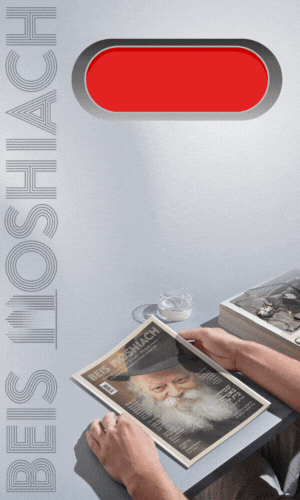Lubavitcher Creates Life Saving App
A personal tragedy and a host of life events prompted Yogev Dery to launch J-SOS – an app that provides emergency assistance to Jews and Israelis traveling abroad • J-SOS volunteers provide wider coverage than some state intelligence agencies, Dery says • Full Story
Yogev Dery received the bitter news about four years ago. A close relative had been killed in a jeep accident in the Judean Desert. Critical hours passed before he and his friends were found. Their endless attempts to call for help were futile and they were only found the following day, when it was too late.
“As time passed, people started to realize that something was wrong,” Dery recalls. “It was only after several hours of uncertainty that the search for them began. Precious time was lost.”
Around that time, Dery and his family went on a trip to Italy. Having preordered a rental car from Israel, he went looking for the company upon arriving in Italy. “I asked a group of police officers how to get to the car rental company, but there was no response. We approached another police officer and another police officer, and none spoke any English. Suddenly a thought occurred to me: What would happen if we had to explain to them that one of our children had gone missing, God forbid, or that some other terrible thing had happened?”
These two events, coupled with stories of Jews who disappeared or were killed while traveling abroad, prompted Dery to create his J-SOS (Jewish SOS) app, which is designed to rescue Jewish and Israeli travelers who encounter emergencies anywhere in the world.
“The drive to save the lives of Jews and Israelis who are in danger is our utmost priority,” declares Dery, who once served as a SWAT police officer and also manned a sensitive position in the Israeli defense establishment. Today, Dery works as the CEO and founder of J-SOS, which is also a nonprofit organization.
The J-SOS app relies on thousands of Chabad emissaries around the world who volunteer to offer assistance. The volunteers are overseen by country and continent directors.
When Jews and Israelis abroad encounter danger – be it a terrorist threat, a health scare, an accident or an earthquake or tsunami – all they have to do is push the SOS button on the app and their call, including their exact location, is transmitted to a local Chabad volunteer in the same country and also to a round-the-clock situation room in Israel, operated by the nonprofit organization.
From the situation room in Israel “we confirm the information with the individual, to make sure they didn’t push the button accidentally,” Dery explains.” Once the emergency is confirmed, the local volunteer, who speaks the language and has the relevant contact information, summons the local rescue services to provide assistance.”
One of the app’s many features is the ability to contact the situation room in Israel even when the phone does not have an active internet plan or a Wi-Fi connection.
Another feature was developed after Hamas terrorists abducted and murdered three Israeli boys in June 2014. Immediately after the abduction, one of the boys managed to call the police, but the call was not followed through because the boy was unable to describe the emergency on the phone. Dery, who participated in the rescue operation in a classified role after this abduction, developed a “walk with me” feature for “when you can’t make a call or explain what the problem is.”
“When a Jew is in danger, all he has to do is press the button and keep it pressed down. We then get an alert indicating that the user is in danger. As long as the button is pressed, we get an exact location every 5 seconds. If something happens and the button is released, within 3 seconds an SOS call is sent to us. If everything is alright and it was a mistake, they can undo the call.”
Q: When the alert comes in, how does the Chabad volunteer know who to call?
“We try to contact the user first from the situation room, through the app. If they don’t answer, we try to call the user’s phone. If they still don’t answer after a number of attempts, we instruct the volunteer to alert the local police. Even if we don’t know exactly what happened to a person, at least help will arrive that can call in more relevant help if needed.”
Q: What happens in cases when travelers get lost in places without any cell phone reception?
“After a user installs the app on their phone, their location is recorded every 501 meters, as long as their GPS service is turned on. If, God forbid, parents call in and report that their child hasn’t made contact in a week, we can immediately see where they were last where there was cell reception.”
“We also have the ability to send a photo of the missing individual to all the app users in the vicinity of where they were seen last. We ask them if they saw the person and they answer yes/no. Everyone there will receive the photo to their phone and it allows us to gather intelligence live from the area.”
“But I can’t stress enough: It is important for every person traveling abroad to purchase a medical insurance package. We are not a substitute for an insurance policy.”
Q: What happens in the event of a mass-casualty incident or a terrorist attack?
“We try to make contact and wait. Through the app, we send a message to the phone asking ‘do you need medical assistance?’ It allows us to map these events within minutes. Who is okay, who is not connected and who needs assistance.”
“Users who answer ‘yes’ – we collect their information, including an exact location, in the situation room. All that’s left is to locate a local rescue team and let them know that 39-year-old Moshe Levy, for example, is located on this street, and we can provide a map. That’s something that we have achieved through our work with the Foreign Ministry, and that’s a big part of it. We work with the Foreign Ministry both in individual emergencies and large-scale events.”
Q: Do Chabad volunteers undergo any training before they are dispatched to provide assistance?
“Since the requirement is only to pick up the phone and call the local rescue services in the country where they live, training is not necessary,” he said.
Dery, 42, is married and has five children. He has a degree in law, but ever since he was 14 years old he has worked to save lives. At 14, he volunteered with the Magen David Adom emergency medical service. Today he is a Chabad Hassid with a thick beard and traditional hat, but he still serves in the IDF reserves as a captain in a classified unit.
The app, which takes up all of Dery’s time, is financially backed by a high-tech company that believes in his vision. The company donated the app, while the non-profit continues to invest additional funds in its ongoing development. After two and a half years of trials, during which the app was tested by various security bodies, it can now be downloaded free of charge to both iPhones and Android phones.
The Foreign Ministry has pledged full cooperation with app users and has urged other government offices to cooperate with the app as well.
“The app is accurate to within a 4-meter radius,” Dery says. “We tested it in a great number of countries and it works in every hellhole in the world.”
“Every Jew and Israeli who downloads the app is connected to us, always,” he adds, saying that the advantage of his app over other similar services is that it operates everywhere in the world.
“In any location you choose, no other service has the kind of coverage of people that we have in certain areas in the world. That is what makes us unique,” he continues.
“We offer a trifecta of Chabad emissaries around the world, a round-the-clock situation room and the app. Another thing that makes us unique is that we did not develop this app to make a profit – our goal is to save the lives of Jews and Israelis. We operate on donations that help us complete our work. Donations can be made on our website www.j-sos.com,” he says.
Q: The apps WhatsApp and Waze also have features that let users send their location when they are in trouble.
“If a good friend of yours takes a trip to Zanzibar and something happens to him, and he lets you know – he even goes into his WhatsApp and sends you his location – what can you do with that information? Our strength is our collaboration with Chabad emissaries who are spread out everywhere in the world. Like I said, we have better coverage than some intelligence agencies that, as we know, reach far and wide.”
Q: After the trial period for the app, what did you learn about the way people operate and respond in emergencies?
“People become helpless in an emergency. They don’t know what to do. Usually, they go into reactionary mode, which was obviously not planned, and they don’t have the power to help themselves. That’s why we put a great emphasis on the aspect of location and crowdsourcing. In our case, the use is very simple. You just enter the app and push the SOS button, and help is already on its way.”
Q: Did you confront any real emergencies during testing?
“We have not yet had a real rescue abroad – unless you count my friend who got stuck with his jeep east of the Jordan River, in the Golan Heights, and didn’t know where he was. In order to help him, I used the app – I pulled him up on the map immediately and we reached him within minutes. If it were a real emergency, we would send the Golan rescue team to search for him. But this incident demonstrated the app’s accuracy and simplicity.”
Q: Is there a country that you particularly focus on because of a heightened threat level?
“Human life is human life. It doesn’t matter where you are or what country. We are prepared with the same attention, responsibility and professionalism everywhere in the world.”
Q: Where do you see the app in a few years’ time?
“First, I envision a few million downloads, God willing. Ideally, every Jew in the world will download this app. The State of Israel is a small market compared to the number of Jews in the world. Today the app is just starting out, but we are connected to a big technology company and the sky is the limit with them. I hope that in three or four years there will not be a single Jew or Israeli without this app in their pocket.”
“It’s going to be something that encompasses the entire package of everything you need when traveling abroad, ranging from emergency assistance to leisure activities. In the future, the app will feature hotel booking, medical insurance purchase options, attractions and local restaurants. Of course, we will make sure that it doesn’t become too commercial or encumbered with ads. We want people to download this app and have peace of mind during their vacation.”
458
Join ChabadInfo's News Roundup and alerts for the HOTTEST Chabad news and updates!










































